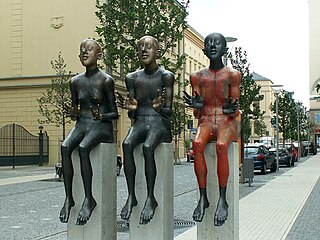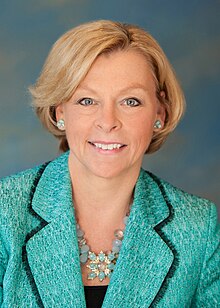
The First Amendment to the United States Constitution prevents the government from making laws that: regulate an establishment of religion; prohibit the free exercise of religion; abridge the freedom of speech, the freedom of the press, the freedom of assembly, or the right to petition the government for redress of grievances. It was adopted on December 15, 1791, as one of the ten amendments that constitute the Bill of Rights.
Freedom of religion or religious liberty is a principle that supports the freedom of an individual or community, in public or private, to manifest religion or belief in teaching, practice, worship, and observance. It also includes the right not to profess any religion or belief or "not to practise a religion".

The judiciary is the system of courts that adjudicates legal disputes/disagreements and interprets, defends, and applies the law in legal cases.

Toleration is when one allows, permits, or accepts an action, idea, object, or person that one dislikes or disagrees with.

Prison Fellowship is the world's largest Christian nonprofit organization for prisoners, former prisoners, and their families, and a leading advocate for justice reform.
Elk Grove Unified School District v. Newdow, 542 U.S. 1 (2004), was a case decided by the U.S. Supreme Court. The lawsuit, originally filed as Newdow v. United States Congress, Elk Grove Unified School District, et al. in 2000, led to a 2002 ruling by the United States Court of Appeals for the Ninth Circuit that the words "under God" in the Pledge of Allegiance are an endorsement of religion and therefore violate the Establishment Clause of the First Amendment to the United States Constitution. The words had been added by a 1954 act of Congress that changed the phrase "one nation indivisible" into "one nation under God, indivisible". After an initial decision striking the congressionally added "under God", the superseding opinion on denial of rehearing en banc was more limited, holding that compelled recitation of the language by school teachers to students was invalid.

The Religious Freedom Restoration Act of 1993, Pub. L. No. 103-141, 107 Stat. 1488, codified at 42 U.S.C. § 2000bb through 42 U.S.C. § 2000bb-4, is a 1993 United States federal law that "ensures that interests in religious freedom are protected." The bill was introduced by Congressman Chuck Schumer (D–NY) on March 11, 1993. A companion bill was introduced in the Senate by Ted Kennedy (D-MA) the same day. A unanimous U.S. House and a nearly unanimous U.S. Senate—three senators voted against passage—passed the bill, and President Bill Clinton signed it into law.
City of Boerne v. Flores, 521 U.S. 507 (1997), was a landmark decision of the Supreme Court of the United States concerning the scope of Congress's power of enforcement under Section 5 of the Fourteenth Amendment. The case also had a significant impact on historic preservation.
The Free Exercise Clause accompanies the Establishment Clause of the First Amendment to the United States Constitution. The Establishment Clause and the Free Exercise Clause together read:
Congress shall make no law respecting an establishment of religion, or prohibiting the free exercise thereof...
Jehovah's Witnesses believe that God's kingdom is a literal government in heaven, ruled by Jesus Christ and 144,000 "spirit-anointed" Christians drawn from the earth, which they associate with Jesus' reference to a "new covenant". The kingdom is viewed as the means by which God will accomplish his original purpose for the earth, transforming it into a paradise without sickness or death. It is said to have been the focal point of Jesus' ministry on earth. They believe the kingdom was established in heaven in 1914, and that Jehovah's Witnesses serve as the kingdom's representatives on earth.
Employment Division, Department of Human Resources of Oregon v. Smith, 494 U.S. 872 (1990), is a United States Supreme Court case that held that the state could deny unemployment benefits to a person fired for violating a state prohibition on the use of peyote even though the use of the drug was part of a religious ritual. Although states have the power to accommodate otherwise illegal acts performed in pursuit of religious beliefs, they are not required to do so.

Criticism of religion involves criticism of the validity, concept, or ideas of religion.
Writ is a legal commentary website on the topic of the law of the United States hosted by FindLaw. The website is no longer adding content, having published its last entry in August 2011. Before then, Writ published at least one new column by one of its regular columnists every business day, and frequently posted a second column by a guest columnist. The regular columnists were all notable attorneys. Almost all contributors are law professors; some are former law clerks from the U.S. Supreme Court; some are past or present federal prosecutors; one is a former Counsel to the President; one is a novelist, and one is the current director of the Terrorism and Counterterrorism Program of Human Rights Watch. The guest columnists also tend to be law professors or seasoned attorneys. When the website was still producing new content, columnists commented both on notable ongoing court cases and recent court decisions, as well as on current events.
Sherbert v. Verner, 374 U.S. 398 (1963), was a case in which the Supreme Court of the United States held that the Free Exercise Clause of the First Amendment required the government to demonstrate both a compelling interest and that the law in question was narrowly tailored before it denied unemployment compensation to someone who was fired because her job requirements substantially conflicted with her religion.

Darwin's Angel is a book published in response to Richard Dawkins' The God Delusion. It was written by John Cornwell and subtitled An Angelic Riposte to The God Delusion.
The feminist movement has affected change in Western society, including women's suffrage; greater access to education; more equitable pay with men; the right to initiate divorce proceedings; the right of women to make individual decisions regarding pregnancy ; and the right to own property.

Children's Healthcare Is a Legal Duty (CHILD) was from 1983 to 2017 an American nonprofit membership organization that worked to stop child abuse and neglect based on religious beliefs, cultural traditions, and quackery. CHILD opposed religious exemptions from child health and safety laws. These exemptions have been used as a defense in criminal cases when parents have withheld lifesaving medical care on religious grounds. These exemptions also have discouraged reporting and investigation of religion-based medical neglect of children and spawned many outbreaks of vaccine-preventable diseases and deaths. CHILD publicized the ideological abuse and neglect of children, lobbied for equal protection laws for children, and filed lawsuits and amicus curiae briefs in related cases.
Law and religion is the interdisciplinary study of relationships between law, especially public law, and religion. Over a dozen scholarly organizations and committees focussing on law and religion were in place by 1983, and a scholarly quarterly, the Journal of Law and Religion, was first published that year. The Ecclesiastical Law Journal began publication in 1987. The Rutgers Journal of Law and Religion was founded in 1999. The Oxford Journal of Law and Religion was founded in England in 2012.

Caviezel v. Great Neck Public Schools, 500 Fed. Appx. 16 (2012), is a decision of the United States Court of Appeals for the Second Circuit upholding the denial of a religious exemption to mandatory vaccination sought by a parent who claimed to adhere to a non-denominational religious view without a formal doctrine.









